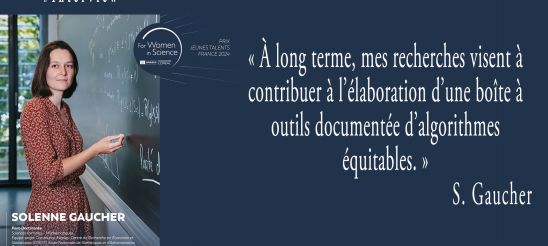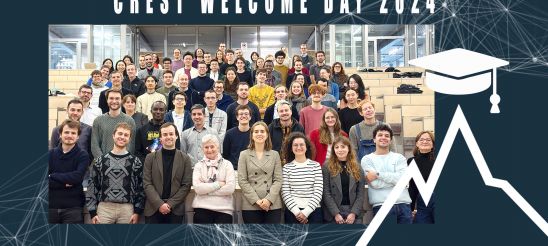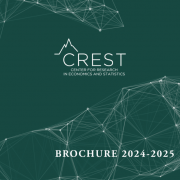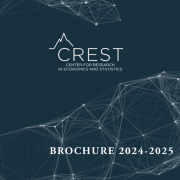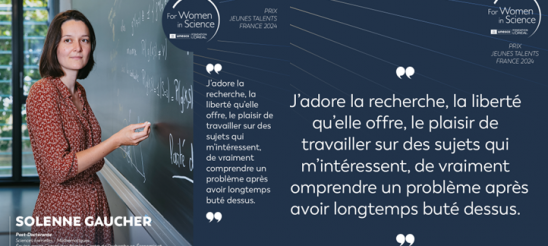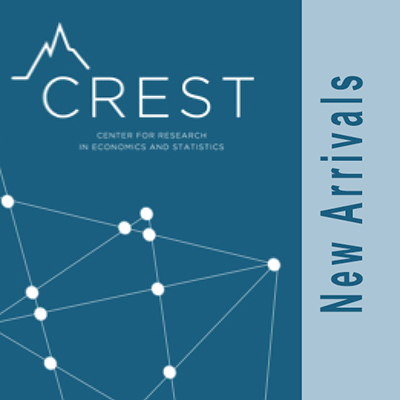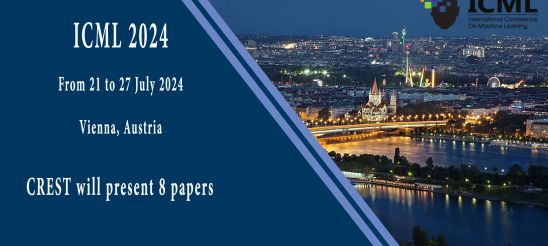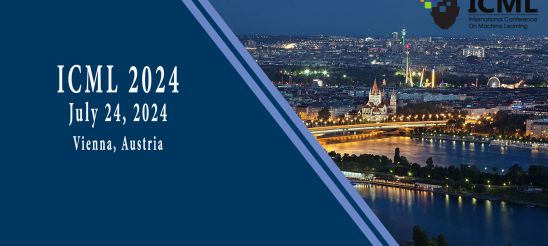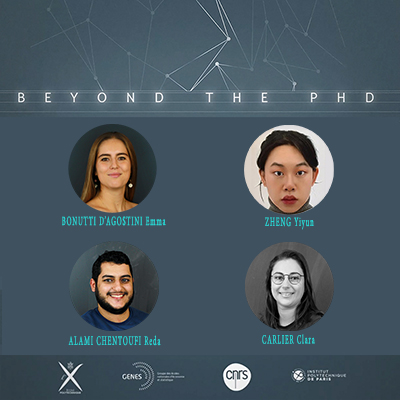Solenne Gaucher, post-doctorante statisticienne, au CREST-GENES a récemment obtenu le prestigieux prix L’Oréal Unesco pour les femmes et la science. Elle s’intéresse principalement à l’apprentissage séquentiel et aux problèmes de décision séquentielle, ainsi qu’à l’apprentissage automatique équitable.
Au sein du CREST, Solenne travaille avec Vianney Perchet, chercheur en statistique et enseignant à l’ENSAE Paris sur le projet FairPlay, en partenariat avec l’INRIA.
Nous avons saisi l’occasion de ce prix pour en savoir un peu plus sur Solenne, son parcours et son travail au CREST.
Félicitations pour ce prix prestigieux ! Que représente pour vous le fait de recevoir le prix L’Oréal Unesco pour les femmes et la science ?
Je suis profondément honorée de recevoir ce prix, décerné par un jury aussi prestigieux. Au-delà de la reconnaissance de mes travaux, ce prix s’accompagne d’une responsabilité que je prends à cœur. En tant qu’ambassadrice de la Fondation L’Oréal-Unesco pour les Femmes et la Science, je souhaite soutenir activement sa mission : promouvoir une plus grande inclusion des femmes dans le domaine scientifique, qui est un enjeu fondamental pour l’égalité des genres.
A votre avis, quelles sont les raisons de la sous-représentation des femmes en science, et quel impact une meilleure représentativité pourrait-elle avoir ?
Le nombre de femmes dans les domaines scientifiques reste alarmant. En France, elles ne représentent que 29% des chercheurs en sciences, et cette proportion chute encore davantage dans des disciplines comme les mathématiques, où seulement 22% des enseignantes-chercheuses à l’université sont des femmes. Ces chiffres, bien qu’ils reflètent la faible présence des femmes dans les filières scientifiques, en sont également une des causes.
Je suis convaincue que le manque de modèles féminins visibles dans l’enseignement supérieur peut freiner les ambitions des étudiantes, les poussant à douter de leur légitimité. A cela s’ajoutent d’autres facteurs :
- Un soutien insuffisant de l’entourage pour s’engager dans des carrières scientifiques ;
- Un sentiment d’illégitimité dans un environnement perçu comme très masculin ;
- Une aversion plus marquée pour la compétition, qui peut éloigner certaines jeunes femmes de filières considérées comme élitistes.
Cette situation est préoccupante, car elle freine l’égalité des genres dans notre société. Les études scientifiques ouvrent les portes à des carrières parmi les plus prestigieuses et les mieux rémunérées. Pour y remédier, il est indispensable de mener des actions ciblées tout au long du parcours des jeunes femmes, dès la petite enfance, en luttant contre les stéréotypes de genre, et jusqu’aux études supérieures, en les conseillant sur leur orientation et en les encourageant activement à se tourner vers des carrières scientifiques.
Comment pensez-vous que ce prix influencera votre carrière et vos projets de recherche futurs ?
En tant que jeune chercheuse, ce prix apporte à la fois une reconnaissance et une visibilité précieuse à mes travaux. Plus matériellement, ce prix conséquent me donne une certaine indépendance financière, et me permettra notamment de financer un séjour de recherche à l’étranger, de voyager pour présenter mes travaux et nouer des collaborations avec des chercheurs de divers horizons. Ce prix ouvre donc de nouvelles perspectives pour mes projets de recherche.
Vous avez obtenu ce prix dans le cadre de votre travail sur l’équité algorithmique. Pouvez-vous nous présenter ces travaux ?
Mes travaux portent sur les enjeux d’équité dans les algorithmes d’apprentissage automatique, ou machine learning. Pour comprendre pourquoi ces algorithmes peuvent produire des réponses biaisées, il est essentiel de comprendre leur fonctionnement : ils apprennent à partir de larges jeux de données à repérer des relations entre différents éléments décrits par ces données. Par exemple, un logiciel de génération de texte associe certains mots à des contextes spécifiques et reproduit ces associations dans ses réponses.
Cependant, si les données d’entraînement contiennent des biais, les algorithmes risquent de les reproduire, voire de les accentuer. Par exemple, des journalistes de Reuters ont rapporté qu’un algorithmes de recrutement d’ingénieurs, entraîné sur des données historiques de recrutement, reproduisait les biais présents dans les données en discriminant les candidatures féminines. De tels cas illustrent un consensus croissant parmi les scientifiques : les algorithmes de machine learning, lorsqu’ils sont formés sur des données biaisées, peuvent perpétuer ou aggraver les discriminations déjà présentes.
Mes recherches visent à mesurer et prévenir les discriminations des algorithmes. La complexité du sujet dépasse son aspect purement mathématique : une décision juste dans un contexte peut sembler injuste dans un autre, ce qui nécessité de développer différentes approches complémentaires. A court terme, le souhaite étudier certains critères d’équité spécifiques, et en particulier comprendre les conséquences de ces contraintes, et comment les intégrer dans les algorithmes. A long terme, mes recherches visent à contribuer à l’élaboration d’un boîte à outils documentée d’algorithmes équitables. Celle-ci fournirait aux décideurs des méthodes pratiques pour mettre en œuvre tel ou tel critère tout en expliquant les conséquences et les effets néfastes potentiels de ces choix.
Pouvez-vous nous expliquer ce qui vous a motivé à explorer le domaine de l’équité dans les algorithmes d’intelligence artificielle ?
Ce domaine de recherche présente deux intérêts majeurs à mes yeux. D’une part, il permet de répondre à un problème ayant un impact sociétal significatif, où les mathématiciens et mathématiciennes ont un rôle clé à jouer. D’autre part, il s’agit d’un champ de recherche émergeant et particulièrement dynamique. De nombreuses questions fondamentales restent ouvertes, et ce domaine présente des défis mathématiques vraiment captivants.
Qu’est-ce qui vous a poussé à choisir une carrière de chercheuse en statistiques et en mathématiques appliquées ?
J’ai choisi de faire une carrière scientifique par passion pour les mathématiques. Je n’avais pas de métier précis en tête en commençant mes études, et pas d’autre but en tête que celui de continuer à pratiquer des sciences. Je ne visais pas un métier en particulier, mais je savais que ces études m’ouvraient de nombreuses portes. J’ai suivi, à chaque choix d’orientation, la voie qui me permettait de continuer à faire des mathématiques, qui me plaisaient particulièrement. J’ai donc assez naturellement fait un master de recherche, qui m’a conduit à faire une thèse.
J’aime particulièrement la liberté que le métier de chercheuse m’offre. En premier lieu, la liberté de travailler sur les problèmes qui m’intéressent, et de continuer à apprendre de nouvelles techniques, à découvrir de nouveaux sujets. Et, bien sûr, la liberté de choisir avec qui travailler. C’est aussi un métier qui procure un vrai plaisir intellectuel : celui de modéliser un problème réel en termes mathématiques, de réfléchir et de raisonner, de comprendre !
L’enseignement est également une partie de ce métier que je trouve vraiment gratifiante, car elle permet de mesurer immédiatement l’impact de son travail, à travers les progrès visibles de ses élèves.
Welcome Day at CREST – A Great Start to the New Academic Year
On October 10, 2024, CREST held its annual Welcome Day, an event dedicated to welcoming new members (research assistants, PhD students, postdoctoral fellows, and faculty members), offering them an introduction to the laboratory through presentations from the management team and thematic leaders.
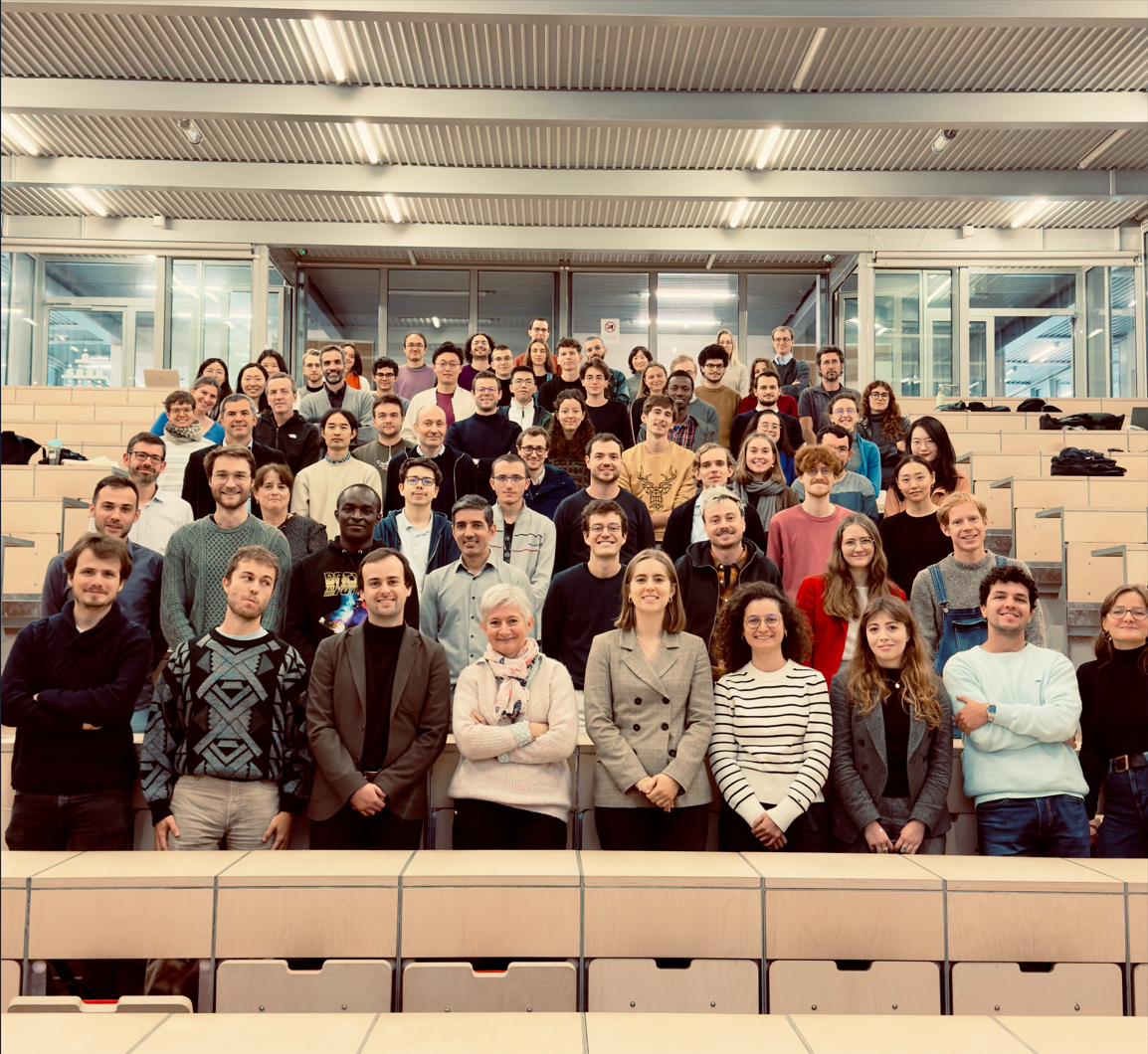
This year, all CREST sites (CREST-ENSAE Paris, CREST-ENSAI, and CREST-Télécom Paris) gathered at the ENSAE Paris campus.
The presentations provided the new members with a comprehensive understanding of CREST’s institutional environment, particularly its affiliations with the Institut Polytechnique de Paris and the University of Rennes. Each newcomer also had the opportunity to introduce themselves and their research project, fostering exchanges with both new and existing members of CREST.
The thematic leaders highlighted well-being initiatives at CREST, as well as the structure of the doctoral program at IP Paris. The event also allowed the administrative team to outline their roles and share useful recommendations.
Our scientific data engineers demonstrated Onyxia, a solution recently deployed in collaboration with GENES.
Finally, CREST PhD students shared information about various reading groups, other lab initiatives, and teaching opportunities available during the doctoral program.
This event also marked the unveiling of CREST’s new institutional brochure for the academic year, which provides an overview of the lab’s research and teaching activities, as well as its prestigious achievements.
Solenne Gaucher named one of the L’Oréal-UNESCO 2024 France Young Talents for Women in Science
Congratulations to Solenne Gaucher, Ph.D. for winning the 2024 Fondation L’Oréal – UNESCO #ForWomenInScience France Young Talent Award!
Solenne Gaucher, Ph.D., is a postdoctoral researcher at CREST-GENES – Groupe des Écoles Nationales d’Économie et Statistique-ENSAE Paris where she dedicated her work to fair marchine learning algorithms on the FairPlay project with Vianney Perchet and Inria.
We are proud that her dedication and the excellence of her research have been recognized by Académie des sciences, Fondation L’Oréal and UNESCO, which empowers women scientists and inspires the next generation.
Read more on the official press release: https://www.fondationloreal.com/sites/default/files/2024-10/cp_prix_jeunes_talents_2024_l_oreal-unesco_for_women_in_science_vdef.pdf
Projet FAIRPLAY : l’intelligence artificielle, joueuse de poker hors pair
Projet FAIRPLAY : l’intelligence artificielle, joueuse de poker hors pair
Welcome at CREST: Introducing our latest recruits.
Each year, CREST goes beyond its borders to find new minds to keep on offering pioneer research. This year, CREST was able to attract new talents from all around the world (Canada, France, Italy, Switzerland, UEA, UK and USA). These new recruits bring with them a wealth of knowledge, diverse experiences, and a passion for pushing the boundaries of their respective fields. New recruits is always very much appreciated by our PhD students and students from ENSAE Paris, ENSAI and École polytechnique, where they may teach as they arrive with a different background and knowledge base.
As CREST continues to produce groundbreaking research about and for society, the arrival of these scholars marks a significant milestone in our journey. Each professor brings unique expertise that will not only enhance our ongoing projects but also open new avenues for exploration and discovery.
In this article, we will introduce you to our new researchers, delve into their backgrounds, and share their specializations that will contribute to the vibrant research environment at CREST.
Economics
Laurent Bach, Visiting Professor (ESSEC)

Interests: Entrepreneurial Finance, Corporate Governance, Household Finance, Public Economics, Political Economy
Current position: Laurent is currently and Associate Professor of Finance at ESSEC Business School
Laurent completed is PhD from Paris School of Economics in 2010
Federico Di Pace, Associate Professor (ENSAI)

Interests: Monetary Economics, macro-labor, international economics and applied econometrics
Previous position: Federico was previously a Senior Economist at the Bank of England.
Experienced Senior Economist with a demonstrated history of working in the academia and central banking, Federico conducted economic research with particular focus on labor markets and its interaction with monetary policy. He has conducted academic policy pieces using applied theory and time series econometrics. Federico completed his PhD in Economics at Birkbeck College, University of London.
https://sites.google.com/site/federicodipace/home?authuser=0
Yameng Fan, Assistant Professor (ENSAI)

Interests: Macroeconomics of labor markets, political economy, market power and spatial economics.
Previous position: PhD in Economics from Universitat Pompeu Fabra.
Florian Grosset, Assistant Professor (ENSAE Paris, Institut Polytechnique de Paris)

Interests: Development and environmental economics with interests in labor and firms
Previous position: PhD in Sustainable Development from Columbia University
The first strand of his research focuses on labor and networks in lower-income countries. His work explores how individuals’ labor supply decisions are influenced by their social network members, primarily with field experiments. The second strand of Florian’s research focuses on firms’ responses to environmental changes. It combines insights from the natural sciences with applied micro-economic tools for causal identification.
Marion Leroutier, Assistant Professor (ENSAE Paris, Institut Polytechnique de Paris)

Interests: Applied Environmental Economics focusing on two major environmental issues, ambient air pollution and climate change.
Previous position: Postdoctoral fellow at the Institute for Fiscal Studies.
Marion’s research agenda has two angles. First, she investigates the societal cost of air pollution and the causal impact of climate and environmental policies, with an emphasis on health, productivity and distributional effects. In a second and more early-stage angle, Marion studies the determinants of support for green policies, in particular the role of social norms and identity.
Bertille Picard, Assistant Professor (ENSAI)

Interests: Econometrics, Machine Learning applied to policy evaluation and inequalities.
Previous position: PhD in Economics at Aix-Marseille School of Economics (AMSE)
Yuki Tamura, Assistant Professor (École polytechnique, Institut Polytechnique de Paris)

Interests: Micoeconomic Theory, Market Design, Social Choice and Political Economy.
Previous position: Postdoctoral Associate at the Center for Behavioral Institutional Design, NUY Abu Dhabi.
Finance-Insurance
Roxana Dumitrescu, Associate Professor (ENSAE Paris, Institut Polytechnique de Paris)

Interests: Financial Mathematics, Stochastic Control, Stochastic Differential Games, Mean-field Games, Backward Stochastic Differential Equations, Energy Markets, Machine Learning.
Previous position: Associate Professor in Financial Mathematics at King’s College of London.
Sociology
Samuel Rufat, Assistant Professor (École polytechnique, Institut Polytechnique de Paris)

Interests: Urban Geography, Urban Studies, Spatial Analysis, Socio-Economic Inequalities, Segregation, Socio-Spatial Reconfigurations, Environmental justice, …
Previous position: Lecturer at CY Cergy Université Paris Cité (Géographie-cités)
Hesu Yoon, Assistant Professor (ENSAE Paris, Institut Polytechnique de Paris)

Interests: Inequality, Poverty, and mobility, Community and Urban Sociology, Race, Gender and Class, Cultural Sociology, Social Psychology, Computational Social Science, Mixed Methods.
Previous position: PhD in Sociology at Stanford University.
Hesu’s research asks longstanding questions about spatial inequality in urban sociology: Why do some neighborhoods (or cities) grow by attracting people and capital while others do not? How does this place stratification intersect with racial and class-based inequalities? Combining experimental, computational, and qualitative approaches, she interrogates high-status consumers and place entrepreneurs – such as business owners, landlords, and travel writers – who have the power to mold physical, economic, and symbolic urban landscapes.
Statistics
Vincent Divol, Assistant Professor (ENSAE Paris, Institut Polytechnique de Paris)

Interests: Topics at the intersection of statistics and geometry, including statistical optimal transport, geometric inference and topological data analysis.
Previous position: Junior AI Fellow at Université PSL.
Marie-Pierre Etienne, Associate Professor (ENSAI)

Interests: Development of statistical methods for ecology.
Previous position: Assistant Professor at Agrocampus Ouest.
Marie-Pierre is mainly interested in the use of stochastic processes to model and infer biological processes, particularly ecological processes.
Recently she focused mainly on movement ecology application and the development of statistical methods to extract knowledge from the study of animals, but also fishing vessels movement.
Sébastien Herbreteau, Assistant Professor (ENSAI)

Interests: Statistical and Machine Learning Methods for image processing, inverse problems, optimization and mathematical understanding of neural networks.
Previous position: Postdoctoral Fellow in the Biomedical Imaging Group at the Ecole Polytechnique Fédérale de Lausanne.
Emmanuel Pilliat, Assistant Professor (ENSAI)

Interests: Machine Learning and High-Dimensional Statistics.
Previous position: Postdoctoral Fellow at ENS Lyon.
Ludovic Stephan, Assistant Professor (ENSAI)

Interests: Random graphs, inference problems, machine learning theory.
Previous position: Postdoctoral Fellow in the idePHICS lab at Ecole Polytechnique Fédérale de Lausanne.
My research interests involve the rigorous study of statistical-physics inspired methods, from belief propagation to replica equations.
Welcome at CREST: Introducing our latest recruits.
Each year, CREST goes beyond its borders to find new minds to keep on offering pioneer research. This year, CREST was able to attract new talents from all around the world (Canada, France, Italy, Switzerland, UEA, UK and USA). These new recruits bring with them a wealth of knowledge, diverse experiences, and a passion for pushing the boundaries of their respective fields. New recruits is always very much appreciated by our PhD students and students from ENSAE Paris, ENSAI and École polytechnique, where they may teach as they arrive with a different background and knowledge base.
As CREST continues to produce groundbreaking research about and for society, the arrival of these scholars marks a significant milestone in our journey. Each professor brings unique expertise that will not only enhance our ongoing projects but also open new avenues for exploration and discovery.
In this article, we will introduce you to our new researchers, delve into their backgrounds, and share their specializations that will contribute to the vibrant research environment at CREST.
Economics
Laurent Bach, Visiting Professor (ESSEC)

Interests: Entrepreneurial Finance, Corporate Governance, Household Finance, Public Economics, Political Economy
Current position: Laurent is currently and Associate Professor of Finance at ESSEC Business School
Laurent completed is PhD from Paris School of Economics in 2010
Federico Di Pace, Associate Professor (ENSAI)

Interests: Monetary Economics, macro-labor, international economics and applied econometrics
Previous position: Federico was previously a Senior Economist at the Bank of England.
Experienced Senior Economist with a demonstrated history of working in the academia and central banking, Federico conducted economic research with particular focus on labor markets and its interaction with monetary policy. He has conducted academic policy pieces using applied theory and time series econometrics. Federico completed his PhD in Economics at Birkbeck College, University of London.
https://sites.google.com/site/federicodipace/home?authuser=0
Yameng Fan, Assistant Professor (ENSAI)

Interests: Macroeconomics of labor markets, political economy, market power and spatial economics.
Previous position: PhD in Economics from Universitat Pompeu Fabra.
Florian Grosset, Assistant Professor (ENSAE Paris, Institut Polytechnique de Paris)

Interests: Development and environmental economics with interests in labor and firms
Previous position: PhD in Sustainable Development from Columbia University
The first strand of his research focuses on labor and networks in lower-income countries. His work explores how individuals’ labor supply decisions are influenced by their social network members, primarily with field experiments. The second strand of Florian’s research focuses on firms’ responses to environmental changes. It combines insights from the natural sciences with applied micro-economic tools for causal identification.
Marion Leroutier, Assistant Professor (ENSAE Paris, Institut Polytechnique de Paris)

Interests: Applied Environmental Economics focusing on two major environmental issues, ambient air pollution and climate change.
Previous position: Postdoctoral fellow at the Institute for Fiscal Studies.
Marion’s research agenda has two angles. First, she investigates the societal cost of air pollution and the causal impact of climate and environmental policies, with an emphasis on health, productivity and distributional effects. In a second and more early-stage angle, Marion studies the determinants of support for green policies, in particular the role of social norms and identity.
Bertille Picard, Assistant Professor (ENSAI)

Interests: Econometrics, Machine Learning applied to policy evaluation and inequalities.
Previous position: PhD in Economics at Aix-Marseille School of Economics (AMSE)
Yuki Tamura, Assistant Professor (École polytechnique, Institut Polytechnique de Paris)

Interests: Micoeconomic Theory, Market Design, Social Choice and Political Economy.
Previous position: Postdoctoral Associate at the Center for Behavioral Institutional Design, NUY Abu Dhabi.
Finance-Insurance
Roxana Dumitrescu, Associate Professor (ENSAE Paris, Institut Polytechnique de Paris)

Interests: Financial Mathematics, Stochastic Control, Stochastic Differential Games, Mean-field Games, Backward Stochastic Differential Equations, Energy Markets, Machine Learning.
Previous position: Associate Professor in Financial Mathematics at King’s College of London.
Sociology
Samuel Rufat, Assistant Professor (École polytechnique, Institut Polytechnique de Paris)

Interests: Urban Geography, Urban Studies, Spatial Analysis, Socio-Economic Inequalities, Segregation, Socio-Spatial Reconfigurations, Environmental justice, …
Previous position: Lecturer at CY Cergy Université Paris Cité (Géographie-cités)
Hesu Yoon, Assistant Professor (ENSAE Paris, Institut Polytechnique de Paris)

Interests: Inequality, Poverty, and mobility, Community and Urban Sociology, Race, Gender and Class, Cultural Sociology, Social Psychology, Computational Social Science, Mixed Methods.
Previous position: PhD in Sociology at Stanford University.
Hesu’s research asks longstanding questions about spatial inequality in urban sociology: Why do some neighborhoods (or cities) grow by attracting people and capital while others do not? How does this place stratification intersect with racial and class-based inequalities? Combining experimental, computational, and qualitative approaches, she interrogates high-status consumers and place entrepreneurs – such as business owners, landlords, and travel writers – who have the power to mold physical, economic, and symbolic urban landscapes.
Statistics
Vincent Divol, Assistant Professor (ENSAE Paris, Institut Polytechnique de Paris)

Interests: Topics at the intersection of statistics and geometry, including statistical optimal transport, geometric inference and topological data analysis.
Previous position: Junior AI Fellow at Université PSL.
Marie-Pierre Etienne, Associate Professor (ENSAI)

Interests: Development of statistical methods for ecology.
Previous position: Assistant Professor at Agrocampus Ouest.
Marie-Pierre is mainly interested in the use of stochastic processes to model and infer biological processes, particularly ecological processes.
Recently she focused mainly on movement ecology application and the development of statistical methods to extract knowledge from the study of animals, but also fishing vessels movement.
Sébastien Herbreteau, Assistant Professor (ENSAI)

Interests: Statistical and Machine Learning Methods for image processing, inverse problems, optimization and mathematical understanding of neural networks.
Previous position: Postdoctoral Fellow in the Biomedical Imaging Group at the Ecole Polytechnique Fédérale de Lausanne.
Emmanuel Pilliat, Assistant Professor (ENSAI)

Interests: Machine Learning and High-Dimensional Statistics.
Previous position: Postdoctoral Fellow at ENS Lyon.
Ludovic Stephan, Assistant Professor (ENSAI)

Interests: Random graphs, inference problems, machine learning theory.
Previous position: Postdoctoral Fellow in the idePHICS lab at Ecole Polytechnique Fédérale de Lausanne.
My research interests involve the rigorous study of statistical-physics inspired methods, from belief propagation to replica equations.
8 CREST papers to be presented at ICML 2024
This year, several researchers from CREST will present their papers to the International Conference on Machine Learning (ICML) which will occur from July 21st to 27th.
About ICML
The International Conference on Machine Learning (ICML) is the premier gathering of professionals dedicated to the advancement of the branch of artificial intelligence known as machine learning.
ICML is globally renowned for presenting and publishing cutting-edge research on all aspects of machine learning used in closely related areas like artificial intelligence, statistics and data science, as well as important application areas such as machine vision, computational biology, speech recognition, and robotics.
ICML is one of the fastest growing artificial intelligence conferences in the world. Participants at ICML span a wide range of backgrounds, from academic and industrial researchers, to entrepreneurs and engineers, to graduate students and postdocs.
CREST’s papers to be presented
1. A connection between Tempering and Entropic Mirror Descent
Nicolas Chopin, Francesca R Crucinio, Anna Korba
2. Theoretical Guarantees for Variational Inference with Fixed-Variance Mixture of Gaussians
Tom Huix, Eric Moulines, Alain Oliviero Durmus, Anna Korba
3. Sliced-Wasserstein Estimation with Spherical Harmonics as Control Variates
Rémi Leluc, Aymeric Dieuleveut, François Portier, Johan Segers, Aigerim Zhuman
4. A New Branch-and-Bound Pruning Framework for $ell_0$-Regularized Problems
Guyard Theo, Cédric Herzet, Clément Elvira, Ayse-Nur Arslan
5. Active Ranking and Matchmaking, with Perfect Matchings
Hafedh Ferchichi, Matthieu LERASLE, Vianney Perchet
6. Non-clairvoyant Scheduling with Partial Predictions
Ziyad Benomar, Vianney Perchet
7. Statistically Optimal Generative Modeling with Maximum Deviation from the Empirical Distribution
Elen Vardanyan, Sona Hunanyan, Arnak Dalalyan, Tigran Galstyan, Arshak Minasyan
8. On a Neural Implementation of Brenier’s Polar Factorization
Nina Vesseron, Marco Cuturi
Click here for more information about the conference.
8 CREST papers to be presented at ICML 2024
This year, several researchers from CREST will present their papers to the International Conference on Machine Learning (ICML) which will occur from July 21st to 27th.
About ICML
The International Conference on Machine Learning (ICML) is the premier gathering of professionals dedicated to the advancement of the branch of artificial intelligence known as machine learning.
ICML is globally renowned for presenting and publishing cutting-edge research on all aspects of machine learning used in closely related areas like artificial intelligence, statistics and data science, as well as important application areas such as machine vision, computational biology, speech recognition, and robotics.
ICML is one of the fastest growing artificial intelligence conferences in the world. Participants at ICML span a wide range of backgrounds, from academic and industrial researchers, to entrepreneurs and engineers, to graduate students and postdocs.
CREST’s papers to be presented
1. A connection between Tempering and Entropic Mirror Descent
Nicolas Chopin, Francesca R Crucinio, Anna Korba
2. Theoretical Guarantees for Variational Inference with Fixed-Variance Mixture of Gaussians
Tom Huix, Eric Moulines, Alain Oliviero Durmus, Anna Korba
3. Sliced-Wasserstein Estimation with Spherical Harmonics as Control Variates
Rémi Leluc, Aymeric Dieuleveut, François Portier, Johan Segers, Aigerim Zhuman
4. A New Branch-and-Bound Pruning Framework for $\ell_0$-Regularized Problems
Guyard Theo, Cédric Herzet, Clément Elvira, Ayse-Nur Arslan
5. Active Ranking and Matchmaking, with Perfect Matchings
Hafedh Ferchichi, Matthieu LERASLE, Vianney Perchet
6. Non-clairvoyant Scheduling with Partial Predictions
Ziyad Benomar, Vianney Perchet
7. Statistically Optimal Generative Modeling with Maximum Deviation from the Empirical Distribution
Elen Vardanyan, Sona Hunanyan, Arnak Dalalyan, Tigran Galstyan, Arshak Minasyan
8. On a Neural Implementation of Brenier’s Polar Factorization
Nina Vesseron, Marco Cuturi
Click here for more information about the conference.
Beyond the PhD – CREST Series 2: How would you define a PhD?
Last year, CREST introduced a new series of videos on the PhD theme. Léa Bou Sleiman & Martin Mugnier were interviewed for this first episode of “Beyond the PhD”. The 4th year economics PhD students present their career at CREST and their participation in the International Job Market.
In 2024, the Beyond the PhD series is focused on the definition of a PhD.
In doing so, four PhD students from CREST have participated in this interview series:
- Reda Alami Chentoufi, 1st year PhD student in Finance-Insurance (CREST-GENES)
- Emma Bonutti d’Agostini, 1st year PhD student in Sociology (CREST-GENES)
- Yiyun Zheng, 2nd year PhD student in Economics (CREST-Ecole polytechnique)
- Clara Carlier, 3rd year PhD student in Statistics (CREST-GENES)
With the participation of Prof. Emmanuelle Taugourdeau, Research Director at CNRS and Deputy Director at CREST, all four PhD students answered some questions about the PhD program: how would they describe it, what is of importance in a PhD and their recommendations to future PhD students.
All videos are now available on the CREST’s YouTube account.
We want here to promote the interview highlights that key points of all interviews in one.
Below, you will find all videos available in the scope of the Beyond the PhD video series 2.

